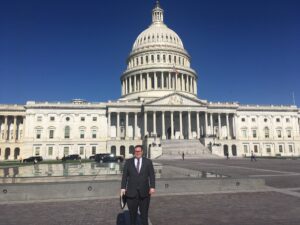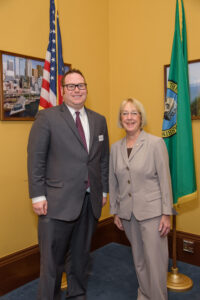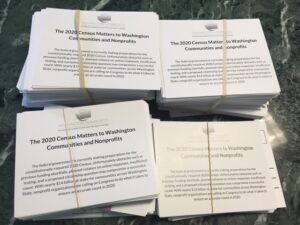
Washington Nonprofits’ Director of Public Policy and Advocacy David Streeter recently visited Capitol Hill to meet with our state’s congressional delegation about the key issues impacting nonprofit organizations. The issues David discussed, and what he learned are below. Click hereto view a one page summary of the issues as well as Washington Nonprofits’ asks to congressional offices.
Charitable Giving
The Tax Cuts and Jobs Act doubled the standard deduction and altered the estate tax, which research projects will decrease charitable giving. It is estimated by the U.S. Congress Joint Economic Committee Democrats that the new law places approximately $285 million in charitable giving at risk for our state. David requested that members of our congressional delegation consider cosponsoring H.R. 5771and/or H.R. 3988in the House and S. 2123in the Senate, all of which would create a universal non-itemizer charitable deduction. H.R. 5771 is a bipartisan bill that contains no deduction cap for tax payers, while H.R. 3988 and S. 2123 are Republican-led bills that have a deduction cap at one third of the standard deduction. In general, lawmakers’ staff members recognized that the Tax Cuts and Jobs Act impacts charitable giving. Unfortunately though, the bills come with an estimated $200 billion+ price tag and the data showing the new tax law’s impact is unlikely to be available until next year at the earliest. Because of this, it is unlikely that any of the three bills will gain momentum during the remaining days of this congressional session. Nonetheless, it was important to flag these bills for congressional offices so that we can build momentum to create a universal charitable deduction in the future.
Johnson Amendment
As you’ll read here, the Johnson Amendment is under threat again in the House Appropriations Committee as part of the Financial Services and General Government Appropriations Bill. David raised this issue with our congressional delegation and expressed the nonprofit sector’s overwhelming support for maintaining the Johnson Amendment. Additionally, David made sure to highlight that the Johnson Amendment repeal effort runs counter to the new DISCLOSE Act passed by the Washington Legislature because it would have the effect of releasing tax-deductible dark money into our elections, which the DISCLOSE Act is meant to address. The key takeaway on this issue is that nonprofit organizations need to continue calling on Congress to maintain the Johnson Amendment so that this vital protection remains in place.
 UBI Tax on Employee Transit Benefits
UBI Tax on Employee Transit Benefits
A provision contained in the Tax Cuts and Jobs Act imposes an Unrelated Business Income Tax on the transportation benefits offered to nonprofit employees. We submitted comments to the IRS urging it to delay implementing Section 512 (a)(6) and (a)(7) of the Internal Revenue Code until clearer guidance is issued. David shared our comments with the congressional offices and asked members to weigh in on this issue with the IRS and we will follow up as action steps become available.
Census 2020
David discussed the importance of the 2020 U.S. Census for nonprofit organizations with each of the offices that he met with. During the meetings, he reiterated the importance of full funding for the Census as well as the omission of the proposed citizenship question. During the meetings, David delivered handwritten postcards from Washington Nonprofits members that shared their perspective on the Census’ importance. The postcards were a meaningful hit and were greatly appreciated by the staff because they represent a direct line of communication between constituents and the officials. As follow up to the meetings, David shared our census video and we will continue to engage with the offices on this important issue. 
As of June 8, 2018, the U.S. Census Bureau has an active comment request in the Federal Register on its proposed data collection plan. This is an opportunity to weigh in on what information is collected (including the proposed citizenship question) and how it is collected (internet collection, in-person, etc…). Your organization can review the request and submit comments here before August 7, 2018. Please contact us with any questions or to discuss what you are planning to submit.
Public Service Loan Forgiveness
Washington Nonprofits supports maintaining the Public Service Loan Forgiveness program, which many nonprofit employees use to manage their student loans. The PROSPER Act (H.R. 4508) contains a provision that would end PSLF for future borrowers. David shared this concern during his meetings and was heartened to learn that there is broad bipartisan support for maintaining the program. Nonetheless, it is still concerning that the future of the program is in jeopardy. Therefore, it is critical that nonprofit employees who use this program contact their Representatives and our Senators and explain to them why the program should continue and be available to future borrowers.
Possible Expansion of “Public Charge” Criteria
Under current regulations, immigrants seeking U.S. citizenship who use a specific set of public support programs are deemed a “public charge.” This is a negative classification that typically leads to a denial of their citizenship request as well as possible deportation. The Trump Administration signaled its intent to expand the list of services to include many programs and services that are administered by nonprofit organizations. The effect of such a change is that many immigrants will cease to use those programs because they are fearful of being deemed a “public charge.” Our members have reported to us that the speculation alone has caused a drop in participation among immigrant communities in certain programs. David conveyed this concern to congressional offices, many of which were unfamiliar with this issue. David asked that the offices plan to issue comments to the Trump Administration when the proposed regulations are posted to the Federal Register in July. David will also be following up with the offices once Washington Nonprofits submits its comments.